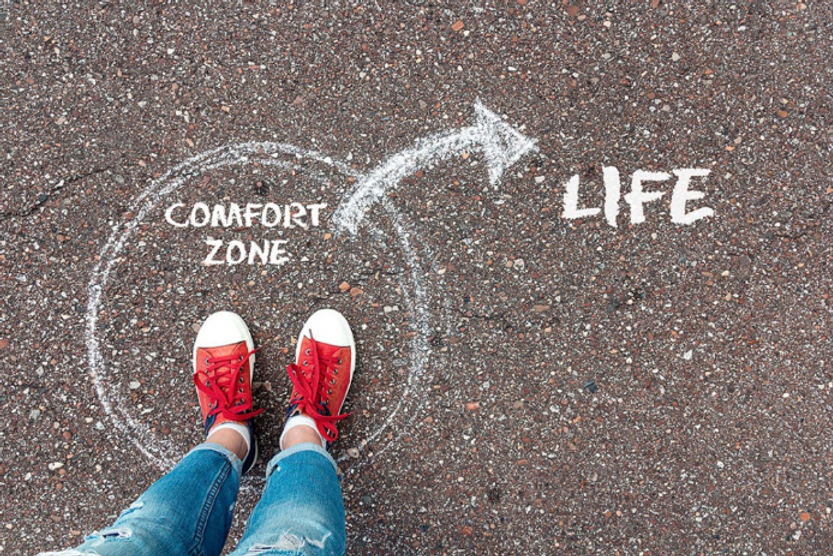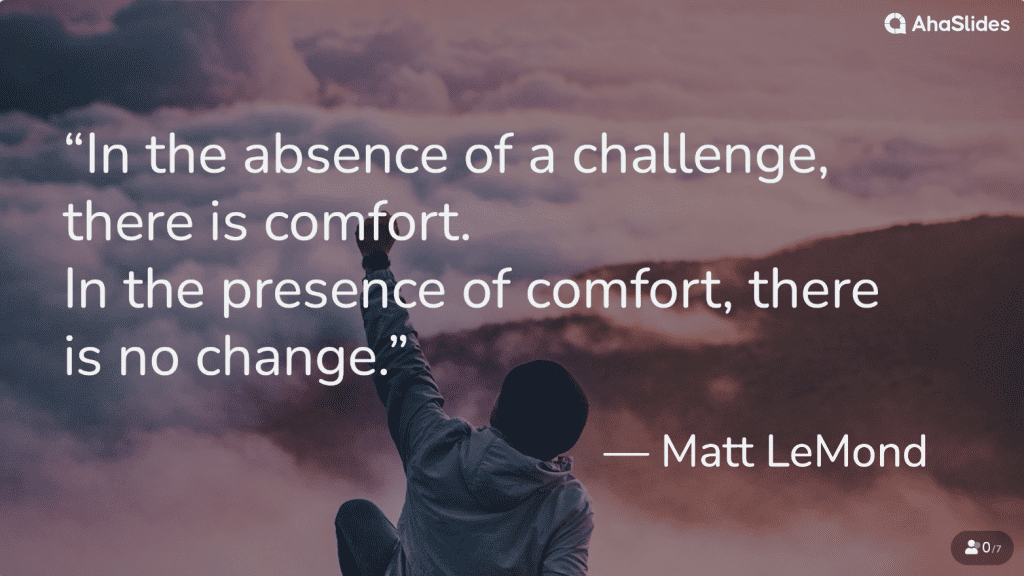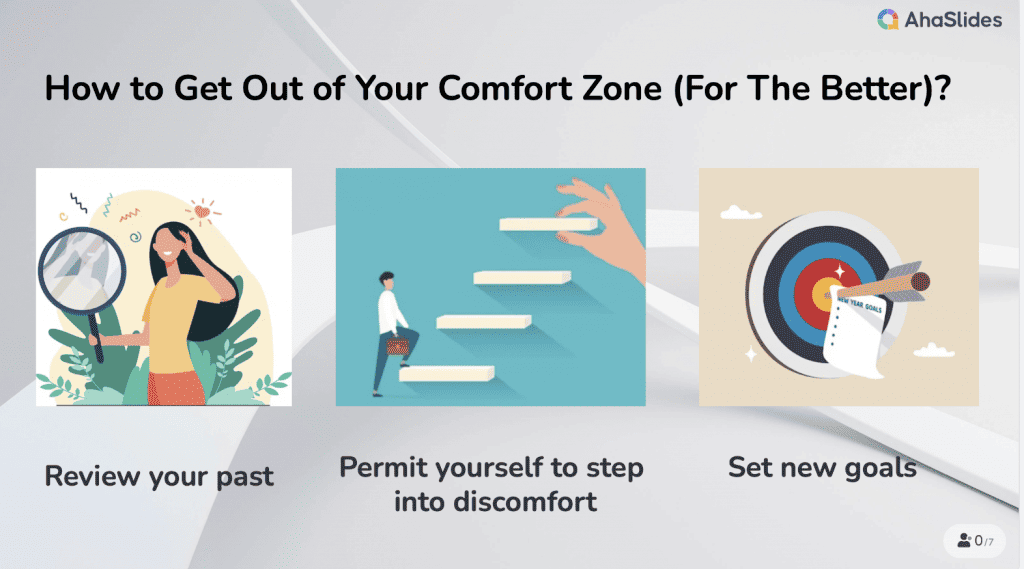What is Comfort Zone in life?
When you are stuck at a dead-end job you hate, or when you expect to lose 5 kilos within 3 months but you procrastinate, many say, "Let's get out of your comfort zone. Don't let fear make your decision for you." What they mean is, try something new!
In almost every case, people advise you to start taking discomfort to achieve something bigger when it comes to doing anything that isn't within your comfort zone. So, What is Comfort Zone? Is Comfort Zone good or bad? Let's find out the answer now!

Table of Contents
- What is Comfort Zone?
- Why Comfort Zone is Dangerous?
- What is Comfort Zone Example with Each Type?
- How to Get Out of Your Comfort Zone?
- Key Takeaways
- Frequently Asked Questions
What is Comfort Zone?
What is comfort zone in life? Comfort Zone is defined as “a psychological state in which things feel familiar to a person and they are at ease and in control of their environment, experiencing low levels of stress and tension.”
Therefore, it can be supposed that stepping outside of your comfort zone might increase anxiety and cause stress. Yes, it is true to some certain extent. According to Alasdair White, to achieve high performance, one is supposed to experience a certain amount of pressure.
The concept is about fear. When you choose to stay in your comfort zone, you are likely familiar with this situation and know exactly how to deal with the problem with confidence. It is a good sign, but it won't last long because change will happen even if you try to anticipate it.
And comfort zone here means using the same approach or mindset to deal with unfamiliar problems, you feel bored and unfulfilled, avoid risks, and don't want to take challenges when taking different solutions. And it's time to get outside of your comfort zone and look for fresh solutions.
What is Comfort Zone Example with Each Type
What is Comfort Zone meaning in different aspects of life? To understand the concept more deeply, here is a brief description and explanation of types of comfort zones and real-world examples. When you identify which state you are in, it is easier to deal with.Emotional comfort zone
What is Comfort Zone related to emotion? The Emotional Comfort Zone pertains to a state where individuals feel emotionally secure, experiencing familiar emotions and avoiding situations that may induce discomfort or vulnerability.People within their emotional comfort zones may resist confronting challenging feelings or engaging in emotionally demanding interactions. Recognizing and understanding one's emotional comfort zone is essential for emotional intelligence and personal growth.
For example, an individual who hesitates to express romantic interest or make new friends due to a fear of rejection. And if this continues, this person may find themselves stuck in a pattern of isolation, missing out on potential meaningful connections and experiences.
Conceptual comfort zone
The Conceptual Comfort Zone encompasses an individual's cognitive or intellectual boundaries. It involves staying within familiar thoughts, beliefs, and paradigms, avoiding exposure to ideas that challenge or contradict existing perspectives.
It is important to break out of the conceptual comfort zone to embrace intellectual diversity, explore new concepts, and be open to alternative viewpoints. It is where creativity, critical thinking, and expansive learning are facilitated.
For example, if you own a business, you might notice that for every positive thing that happens, there is a negative occurrence. For instance, you might gain a new client, but then lose an existing one. Just as you start to feel like you're making progress, something comes along that sets you back. It signifies that it is time to change perspectives and conceptualization.
Practical comfort zone
The Practical Comfort Zone relates to one's day-to-day activities, routines, and behaviors. It involves sticking to familiar or predictable patterns, routines, and methods in various aspects of life, such as work, relationships, and daily tasks.
When you're ready to eliminate your practical comfort zone, you're ready to try new approaches, take on unfamiliar challenges, and embrace change in practical aspects of life. It is vital for personal and professional development, as well as adaptability to evolving circumstances.
For instance, an individual takes the same route to work, dines at the same restaurants, hasn't learned a new skill for years, and socializes in the same circles. It is a perfect example of staying within your
Practical Comfort Zone. The fact is if this person wants to grow with richer experiences, he or she has to commit to changing these habits.
Why Comfort Zone is Dangerous?
The comfort zone is dangerous if you stay within it for a long time. Here are 6 reasons why you shouldn't staying comfort zone too long without making a change.
Complacent
Remaining in the comfort zone fosters complacency. "Complacent" refers to a state of being self-satisfied, content, and unconcerned with potential challenges or improvements. The familiar and routine nature of the comfort zone can lead to a lack of motivation and a diminished drive for personal and professional improvement. Complacency hinders the pursuit of excellence and stifles the desire to achieve more.
Vulnerability to change
People who are comfortable with the current space are inherently resistant to change. While it provides a sense of stability, it also leaves individuals ill-prepared to face unexpected changes. Over time, this resistance can make individuals vulnerable in situations that require adaptability and flexibility.
No risk, no reward
It is a colloquial saying meaning "if you don't take chances then you'll never reap the benefits." Growth and success often come from taking calculated risks. It emphasizes the idea that playing it safe and staying within one's comfort zone may prevent opportunities for significant achievements. Taking calculated risks involves making thoughtful and strategic decisions that, while carrying a level of uncertainty, have the potential for favorable outcomes.
Reduced problem-solving efficiency
Stepping out of your comfort zone is vital when dealing with problems, whether it is related to life, jobs, or relationships. It is quite dangerous to keep the old mindset or habit of solving problems while the surroundings are changing, especially in this era. It may lead to a lag in adapting to new trends, emerging challenges, and evolving opportunities.
Furthermore, the world has become more interconnected than ever, with globalization influencing economies, cultures, and relationships. Problem-solving in this global context requires a willingness to understand diverse perspectives and adapt to the interconnected nature of our societies.
Miss opportunities to expand your comfort zone
One of the most compelling reasons to step out of your comfort zone is to expand it. When you take risks, embrace discomfort and doubt, and ultimately succeed, you not only improve your overall skill set but also boost your confidence. The more you challenge yourself with new and difficult activities, the more comfortable and natural they become, gradually broadening your comfort zone to larger and larger dimensions.
Loose chance of growth
If you really aspire to have exponential growth and improvement, there is no better way than stepping outside your comfort zone. "Life begins at the end of your comfort zone." — Neale Donal Walsch. Tony Robbins also says:" All growth starts at the end of your comfort zone". If you refuse to leave your comfort, you are limiting your abilities and potential, to explore your hidden talents and build a better version of yourself. It's akin to staying in a stagnant pond when the vast ocean of possibilities awaits exploration.
How to Get Out of Your Comfort Zone?
How long have you made a change in daily habits and comfort, 3 months, 1 year, or more than 5 years? Let's spend some time to be aware and reflect on yourselves to see what has been holding you back.

Review your past
Did everyone around you have a "normal" job while you were growing up? Were you constantly told that you should work just to make ends meet and that's all there is to it? Do you find it unhappy when someone says you and your life look exactly the same as you 10 years ago?
Permit yourself to step into discomfort
The most crucial step - accept discomfort and stress when you break out of your comfort zone. Consider the worst-case scenario if you try something new. There is no other path to go, it is tough, but if you overcome it, there will be a wealth of rewards and personal growth waiting for you on the other side.
Set new goals
After identifying the main cause and problem, let's start having a clear and defined goal written down. It can be a daily, weekly, monthly, or yearly goal. Don't make it complicated. Getting out of your comfort zone isn't about saving the world with superpowers, start with simple targets and take action immediately. There is no room for procrastination. Breaking down your larger goal into smaller, manageable steps makes the process more approachable and less overwhelming.
Key Takeaways
What is comfort zone in your life? Learn about yourself and make improvements is never too late.
💡For more inspiration, check out AhaSlides right away! Changing the common way to present a PPT more innovatively and engagingly with the AhaSlides presentation tool. Make a live quiz, create interactive polls, conduct virtual brainstorming, and generate ideas effectively with your team!
Frequently Asked Questions
What is the opposite of the comfort zone?
It is said that the opposite of the Comfort Zone is the Danger Zone, which refers to a space or situation where risks, challenges, or potential dangers are heightened. However, many reckon it is the Growth Zone, where individuals adapt and learn new skills and experiences, with a full of anticipation and excitement for the future.
What is a famous quote about comfort zone?
Here are some inspiring quotes to encourage you to leave your comfort zone:
- “The sooner you step away from your comfort zone you'll realize that it really wasn't all that comfortable.” — Eddie Harris, Jr.
- “Great things never came from comfort zones.”
- Sometimes we have to step out of our comfort zones. We have to break the rules. And we have to discover the sensuality of fear. We need to face it, challenge it, dance with it.” — Kyra Davis
- “A ship in a harbor is safe, but that’s not what a ship is built for.” — John Augustus Shedd
Ref: Peopledevelopmentmagazine | Forbes








